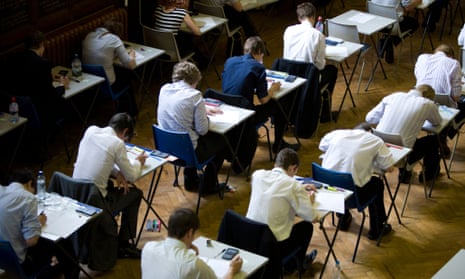Exam boards have been told to change new GCSE maths papers just a few months before students are due to study them, amid concerns they are too tough.
An investigation into the difficulty of the GCSE maths sample papers, led by Ofqual, found there was a “significant risk” that three out of four of the main exam boards’ assessments would be too hard for students across a broad range of abilities.
As part of the research, thousands of students were asked to sit new sample maths papers. The study found average marks were very low compared with what would be expected in a real GCSE exam – even for students from the best-performing schools.
The exam regulator concluded that OCR, Pearson and WJEC Eduqas should make their higher and foundation-tier exam papers easier, while AQA was told to make its foundation paper more difficult.
Overall, the level of difficulty in the sample papers was higher than in current GCSE papers. This is in line with the government’s demands for a more rigorous curriculum.
The research found, however, that the higher-tier papers from WJEC Eduqas and Pearson were so difficult that the top grade was often no more than 50%.
This doesn’t just mean that only more-able students will benefit from the exam process. More importantly, the report notes that it is “likely to prevent the reliable grading of students”.
The investigation was launched after Pearson and OCR wrote to schools in 2014 urging them not to choose which new GCSE maths qualification to take based on sample papers. They also complained to Ofqual that the paper produced by AQA was easier than their own.
The report concluded that OCR and Pearson’s sample papers are harder than their current papers, while AQAs difficulty has remained broadly similar.
The findings were welcomed by exam boards. Rod Bristow, president of UK and core markets at Pearson, said: “As the new GCSE qualifications are introduced into schools for teaching, we will continue to work with the regulator and other exam boards to ensure a fair system for learners and clear information for teachers.”
Mark Dawe, chief executive of OCR, said: “We appreciate Ofqual’s determination to ensure that all awarding bodies’ exams are of the same rigour.”
Andrew Hall, AQA’s chief executive, said: “We’re pleased that Ofqual has recognised that our qualification works properly as an assessment – allowing us to set reliable grade boundaries which will ensure that students get the results they deserve.”
The chief executive of WJEC Eduqas, Gareth Pierce, was also positive about the report. He said: “The overall research findings allow us to refine our sample assessments. In response to Ofqual’s request, we will adjust some of our questions so that we move towards the middle ground in terms of relative difficulty, in the context of a similar expectation being made of all awarding bodies.”
Ofqual has asked all the exam boards to make the changes to their sample material and submit them for approval by the end of June. This presents huge problems for schools who will be teaching the syllabus in just six teaching weeks.
Maths teacher Mel Muldowney said: “I am not convinced that adequate reassurances have been made. This whole process has made the accreditation process look like a debacle.
“Teachers don’t have that time for this back and forth. We have a year 9 cohort of more than 550,000 students across the country – not an insignificant number – who could end up being poorly prepared or the wrong decisions being made about choice of exam board because of the rush.”
Glenys Stacey, Ofqual’s chief regulator, rejected suggestions that the changes would be too late. She said the final exams were more than two years away and the contents of what needs to be taught and learnt is aready available.

Comments (…)
Sign in or create your Guardian account to join the discussion